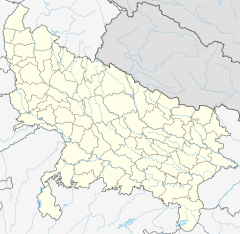| Muhammad Bin Abdullah Masjid | |
|---|---|
Ayodhya Mosque | |
| Religion | |
| Affiliation | Islam |
| Branch/tradition | Sunni |
| Governing body | Uttar Pradesh Sunni Central Waqf Board |
| Status | Under construction |
| Predecessor | Babri Masjid |
| Location | |
| Municipality | Dhannipur, Ayodhya district |
| State | Uttar Pradesh |
| Country | India |
| Geographic coordinates | 26°45′43″N 82°00′07″E / 26.762°N 82.002°E |
| Architecture | |
| Funded by |
|
| Groundbreaking | 26 January 2021 |
| Ayodhya dispute |
|---|
| Organizations |
Muhammad Bin Abdullah Masjid or Ayodhya Mosque is being constructed in Dhannipur, Ayodhya district, Uttar Pradesh, at the Supreme Court of India designated site following the verdict related to the Ayodhya dispute case.[2][3]
The construction of the Mosque and associated complex is under the Indo-Islamic Cultural Foundation (IICF) trust.[4][5] The Dhannipur Mosque is almost 22 km away from the Ram Mandir, Ayodhya,[6] the former site of its predecessor, the Babri Masjid.
The construction began on 26 January 2021.[4] The mosque was officially named as Ahmadullah Shah Mosque, as an honour to the leader of Indian Independence war of 1857, Maulavi Ahmadullah Shah, but was later renamed as Muhammad Bin Abdullah Masjid.[7]
Location
Dhannipur is a hamlet located in Sohawal tehsil in Faizabad district, officially Ayodhya district. The designated plot for the mosque is located at a distance of about 25 kilometres from the Ram Mandir site.
Construction
The project was formally launched by the Uttar Pradesh Sunni Central Waqf Board by hoisting the national flag and planting saplings on Republic Day of 2021. The Mosque complex includes a hospital, museum, library, a community kitchen which can feed a maximum of 2000 people per day, an Indo-Islamic Cultural Research Centre and Publication House in addition to the mosque.[8]
Around 40 per cent of the donations received by the Trust are given by Hindus, while Muslims have contributed 30 per cent. The other 30 per cent of the total donations are corporate donations. Foundation secretary Athar Hussain confirmed that the Trust has to date received Rs 40 lakhs of donations and 40 per cent of it has been contributed by the Hindu community.[9]
Disagreement
The All India Muslim Personal Law Board has stated that the construction of the mosque is against the Waqf Act and is illegal under Shariyat law.[10] AIMIM chief Asaduddin Owaisi also claimed that donating money for construction and praying at the mosque is haraam (forbidden) according to Islamic principles to which the Mosque Trust replied that "serving humanity is not haraam".[11]
Ownership dispute
Two sisters from Delhi filed a petition in Lucknow bench of Allahabad High Court claiming ownership of the land allotted for the mosque along with surrounding 28 acres of land which they said was given to their father at the time of partition.[12]
See also
References
- ^ उरमलिया, आशीष (2022-11-11). "अयोध्या मस्जिद निर्माण में सबसे ज्यादा दान हिंदुओं ने दिया: 36 महीने से एक सड़क बनी थी रोड़ा, नक्शा तक पास नहीं हो पाया". Dainik Bhaskar (in Hindi). Retrieved 2022-11-12.
- ^ "Ayodhya mosque to be named after the Prophet; design finalised". Hindustan Times. 2023-10-13. Retrieved 2023-12-03.
- ^ Mishra, Ishita (2023-10-12). "Proposed mosque in Ayodhya gets a new name and design". The Hindu. ISSN 0971-751X. Retrieved 2023-12-03.
- ^ a b Razak, Hanie Abdul (2021-01-19). "Construction of Ayodhya mosque to begin with flag-hoisting on Republic Day". The Siasat Daily. Archived from the original on 2021-01-31. Retrieved 2021-01-26.
- ^ "Ayodhya Mosque Work Starts On Republic Day With Tricolour Hoisting". NDTV.com. Retrieved 2021-01-26.
- ^ "Dhannipur near Ayodhya already has 15 mosques, local Muslims want hospital and college too". theprint.in. February 7, 2020.
- ^ "Ahmadullah Shah: Ayodhya Mosque to be named after the maulana who died for India's Independence". The Times of India. 25 January 2021. Archived from the original on 2021-01-26. Retrieved 2021-01-26.
- ^ "Ayodhya's Dhannipur mosque project launched with unfurling of tricolour on Republic day". Hindustan Times. Retrieved January 29, 2021.
- ^ उरमलिया, आशीष (2022-11-11). "अयोध्या मस्जिद निर्माण में सबसे ज्यादा दान हिंदुओं ने दिया: 36 महीने से एक सड़क बनी थी रोड़ा, नक्शा तक पास नहीं हो पाया". Dainik Bhaskar (in Hindi). Retrieved 2022-11-12.
- ^ "Ayodhya mosque against Waqf Act, illegal under Shariyat law: AIMPLB". Hindustan Times.
- ^ "Contributing for construction and prayers at masjid in Ayodhya is haraam: Owaisi". Deccan chronicle.
- ^ "Delhi siblings claim ownership of land offered for Ayodhya mosque, move court". The Hindu.


